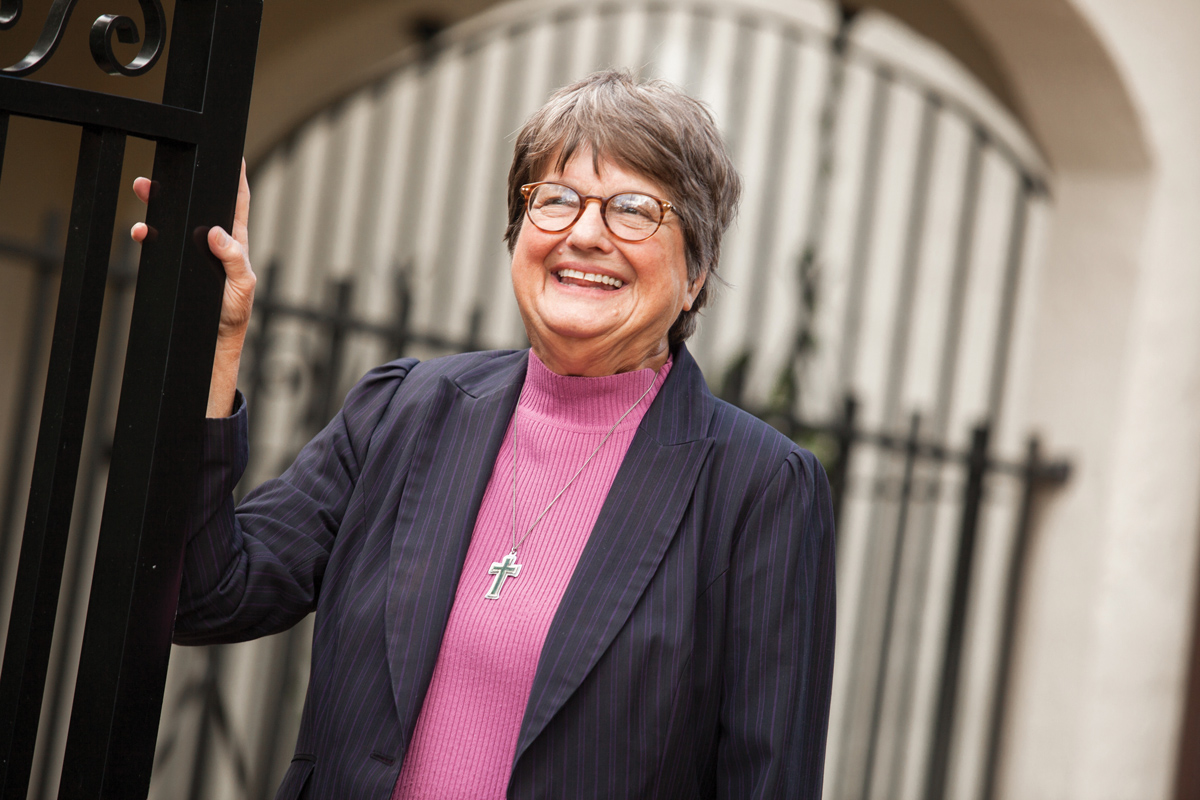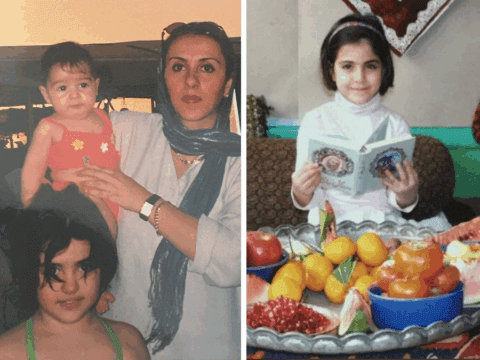This interview first appeared in The United Church Observer’s July/August 2016 issue and was originally published online in 2016.
You may unsubscribe from any of our newsletters at any time.
Alicia von Stamwitz: For 20 years, you were an English and religion teacher at St. Francis Cabrini Elementary School in the suburbs of New Orleans. Why did you leave that life and move to an inner city housing project?
Helen Prejean: [In 1965], Vatican II called religious orders to go back to the Gospels, to go back to the reason we were founded. So we sisters started having meetings about who we were and how we had to be on the side of the poor. I wasn’t a bad nun — I was leading a good, upright life as a nun and a citizen — but I didn’t know any real people who were poor or hungry. I only knew about poverty and hunger. Then God woke me up. God called me to get out of the suburbs and to move into the inner city. I moved into the St. Thomas housing projects in New Orleans, and it was like I’d moved to another country. I sat at the feet of my African-American neighbours, and they began to teach me about the “other” America. Their stories broke my heart. When you are in the presence of people who are suffering, that’s what changes you. Because you can know about injustice, but until you actually see what’s happening, you can’t know how privileged and protected you are.
AVS: How did you initially become involved with death-row inmates?
Helen Prejean: One day [in January 1982], right there in that housing project, a friend said, “Hey, Sister Helen, you want to be a pen pal to somebody on death row?” And I said, “Sure.” I was thinking, I’m an English major, I could send him some poems. I never dreamed they were going to execute this person, Elmo Patrick Sonnier [Convicted murderer of two teenagers, sentenced in April 1978 to be executed by electrocution at the Louisiana State Penitentiary].
AVS: Tell me what you remember about the night of Sonnier’s death.
HP: It happened in the early morning hours of April 5, 1984. Everyone else had to leave the death house except me, because I was his spiritual advisor. When I came out of the executing chamber that night, the prison vehicle brought me to the outer gates. The sisters in my community were standing there waiting for me. I was so cold. They put a coat around me. Then I threw up. I’d never watched a human being be killed right in front of my eyes. I don’t mean to make Pat Sonnier a hero — he did an unspeakably terrible crime, and I was horrified at the crime — but he was a human being. Is human dignity only for the innocent? All human beings are worth more than the worst thing they’ve done in their life; is that not the message of Jesus to all of us?
More on Broadview:
- Half of pastors say they hear conspiracy theories in their churches: U.S. study
- United Methodists find way to ordain LGBTQ2 clergy
- What Revelation can teach progressive Christians
AVS: What happened next?
HP: I read the papers the next day, and they said things like, “Justice was done!” and “We got another one of those criminals!” Everybody in Louisiana and their cat was for the death penalty in ’84. Worse still, statistics showed that the more people went to church, the more strongly they believed in the death penalty. At first, I didn’t know what I was going to do. But then it was clear as a bell in my heart. I realized that the American people were never going to get close to an execution, but I had been a witness; I had seen it, and so I had to tell the story. I began giving talks to anyone who would listen, and I started learning things about the death penalty. I learned that race [and poverty] is a huge factor, especially in laying the groundwork of death penalty cases because the system is still so white. The judges are white. District attorneys are white. Juries are white. That’s why when white people get killed, there’s strong identification — there’s outrage, and juries want the ultimate penalty. In New Orleans, [approximately] 90 percent of our homicide victims are people of colour, but there’s not much outrage by government officials when a person of colour — Latino or Black or Native American — is killed, and the death penalty is seldom sought. If the life is negligible, the death is negligible.
AVS: You’ve acknowledged that you made a “big mistake” when you first became involved in advocacy for the abolition of the death penalty. What was it?
HP: I didn’t know what to do with the victims’ families. I didn’t reach out to them in any kind of way, and when we finally met they were just furious at me. I deserved their anger. I hadn’t written them a note; I hadn’t tried to call just to say, “I’m so sorry about your child.” Lloyd LeBlanc [father of one of Sonnier’s victims] took me through his journey. He explained the pressure he was under. He said, “Everybody was saying to me, ‘Lloyd, you gotta be for the death penalty, or it’ll look like you didn’t love your boy.’ I pictured putting both of those boys [Sonnier’s brother, Eddie, was also convicted] in an electric chair and pulling the switch real slowly so they would feel pain like we were feeling pain.” But he told me he didn’t like what was happening to him. He was angry all the time, and he was losing every bit of kindness that had been in him. So he set his face to go down the road of forgiveness. He’s the real hero of Dead Man Walking.
AVS: Tell me about your correspondence with Pope John Paul II.
HP: In 1997, I was spiritual adviser to [Virginia death row inmate] Joseph O’Dell. The Latin-language definitive edition of the new catechism of the Catholic Church was coming out and [then Cardinal Joseph] Ratzinger had sent it over to Pope John Paul II with his full approval. Nothing had been changed in it about the death penalty; it still had the criterion we had used for 1,600 blooming years, saying that the death penalty can be applied for “grave” crimes. I wrote an impassioned letter to the pope, asking, “You’re going to leave it up to governments to decide what they consider grave or grievous?” And the pope got it. He removed from the catechism the criterion “in cases of extreme gravity.”
AVS: Your work provides a path of action for all of us, not just activists. You seem to be saying: Get educated, and once you see what’s really happening, you will be converted.
HP: Exactly. And my other book, The Death of Innocents: An Eyewitness Account of Wrongful Executions, gets into a lot of that — how the law works. Because before I educated myself, I thought, well, if this is the law of the land, if it’s law, it must be right. That’s where most of us go. We legalize and legitimize the state violence. But you have to take a closer look. You have to get into those laws, and you have to see how they actually work. And if you see that what the laws are actually doing is upholding violence, then you’ve got to resist them. You have to resist them. But first you have to understand them. So when you dig into justice, you are dealing with reality, with what’s really going on. And that’s part of faith: to make faith real. It’s really incarnational. There’s a quote from St. Basil, from the fourth century, that says it all. He said, “Annunciations are frequent, incarnations are rare.”
This interview has been condensed and edited.
















I’m English and not religious. We don’t have the death penalty. I think that makes us civilised. If you execute people that makes you equal to their crime. It makes us all murderers.
Poverty is evil, it’s the scourge of humanity.
It can reduce people to absolute desperation.
Until we have a more equal society and wealth is more evenly distributed then crime will continue.
More crime is committed by the elite in society; because of injustice they are the ones who get away with it.
God commanded that we kill those who murder others, there are many procedures that make sure that this is done properly. When a society kills another for murder it is justice, not criminal intent, a big difference.
You disparage poor people, 99.9999% of which do not commit capital murder.
You can only equate executions and murder if you are immoral or amoral. Do you equate kidnapping and incarceration, robbery and fines, innocent and guilty, crime and punishment?
met Sr. Helen when I was chaplain in New Orleans. She’s the real deal. She was running the Bridges programme in black ghettoes and making connections and service in any way she could imagine. Feet on the ground person always. Direct. Action oriented. Bold. Lived her values and faith. I have worked in prisons in US and Canada. It’s too easy always to lock up and throw away keys, and forget the humanity. Jesus challenged us to visit. I support Amnesty International because people get to “visit” by voicing for the voiceless, and writing to inmates worldwide, to keep their humanity in the forefront.
Jeff:
Please fact check what Prejean says, below.
The voiceless are the murdered innocents, not the guilty murderers, as is obvious.
Some reality.
Sister Helen Prejean: Does Truth Matter?:
Dead Man Walking & The Death Penalty
https://prodpinnc.blogspot.com/2016/01/sister-helen-prejean-does-truth-matter.html